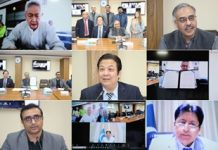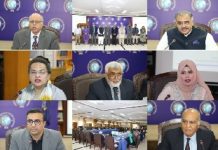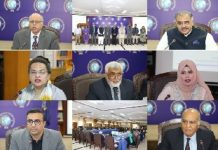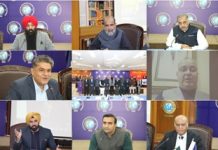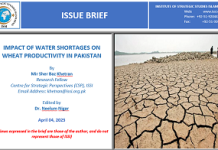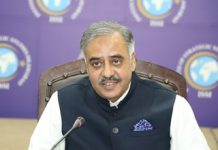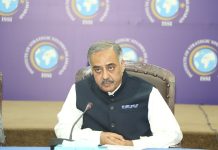Remarks by Ambassador Sohail Mahmood, DG ISSI, at the One-day
ISSI (CAMEA)-FES International Conference
“Pakistan in the Emerging Geopolitical Landscape”
24 April 2024
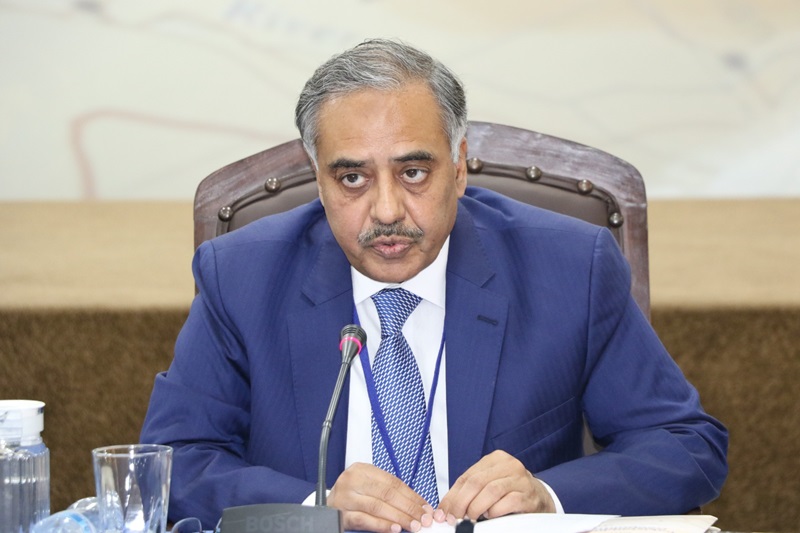
Ambassador Asif Durrani,
Ambassador Khalid Mahmood, Chairman BoG, ISSI,
Dr. Almut Wieland-Karimi, Country Director FES Pakistan,
Eminent Speakers,
Distinguished participants,
AoA and Good Morning!
Let me begin by extending a warm welcome to all the participants in this International Conference on “Pakistan in the Emerging Geopolitical Landscape.” The Institute of Strategic Studies Islamabad (ISSI) is delighted to co-host it with the Friedrich-Ebert-Stiftung (FES) Pakistan Office.
ISSI and FES have a history of fruitful collaboration and this Conference is another milestone in this partnership. I sincerely thank Dr. Almut Wieland-Karimi and FES for this venture and we look forward to our joint endeavors in the future as well.
It is a great privilege to welcome all the distinguished speakers of the Conference – those who have travelled long distances to be with us in-person, those joining us online from abroad, and those joining us from within Pakistan. This is a formidable brain trust, and we all stand to benefit from the insights and wisdom of these scholars, practitioners, and area experts.
We are equally honoured to have Ambassador Asif Durrani, Pakistan’s Special Representative on Afghanistan, as our Chief Guest today. Given his distinguished diplomatic career and profound expertise in regional affairs, Ambassador Durrani is an invaluable interlocutor. His knowledge and understanding of the complex and ever-evolving geopolitical landscape that surrounds Pakistan will undoubtedly enrich our deliberations.
Last but not the least, I would like to acknowledge the tireless efforts of all the colleagues at FES, the Centre for Afghanistan, Middle East & Africa (CAMEA), and the ISSI Administration, in bringing this Conference to fruition. Special thanks to Director Amina Khan and Program Adviser Hamayoun Khan for their leading role.
Distinguished participants,
We are living in a world, today, that is highly polarized, volatile, and fractured. It is also a world on the cusp of historic transformation.
There is accentuation of old and traditional threats, and proliferation of new and non-traditional threats and challenges. And there are new possibilities emerging and even the prospect of unthinkable opportunities.
On the one hand, there is intensifying major-power competition, ongoing wars in Europe and the Middle East, raging and simmering military conflicts in different parts of the world, long-standing unresolved disputes from Palestine to Kashmir, international terrorism and trans-national crimes, lingering health and financial impacts of the global pandemic, and the existential threat of climate change. Historian Adam Tooze has aptly described it as the age of ‘poly-crisis’ – that is, a multitude of crisis situations or a system of parallel, overlapping and connected crises on a global scale.
On the other hand, a transformation in the global order as we have known it for some time appears to be underway. Some are daring enough to proclaim that this is a period of the ‘decline of the West’ and the ‘rise of the rest.’ To a certain degree, a shift in the balance of global power Eastward is discernible. So is a movement towards multi-polarity. If multilateralism seems mortally challenged, a form of ‘mini-lateralism’ and drift towards issue-based coalitions is also evident. New and emerging technologies are having a disruptive and diffusing effect and are creating unprecedented challenges from informational warfare to the militarization of Artificial Intelligence.
Pakistan and its immediate and extended neighbourhood are profoundly affected by these developments. From an unstable and fragile South Asia to a Middle East ravaged by conflict and war; from the deadly impacts of cross-border terrorism to the havoc created by hybrid warfare; and from the volatility of the food and fuel prices to the ravages of extreme weather events, Pakistan — like others — must also navigate its way through a tangled web of threats and challenges and work to realize the opportunities that come forth.
This Conference aims to provide a platform for in-depth discussions and expert analysis on these issues. During the course of the day, we will delve into three key areas: The first Working Session, titled ‘Unraveling the Afghan Conundrum’, will examine the evolving situation in Afghanistan, particularly its impact on Pakistan’s security and foreign policy considerations. Our discussions will explore the challenges and opportunities that lie ahead for Afghanistan as well as the wider region. The second Working Session on ‘The Evolution of the Middle East’ will analyze the fast changing dynamics within the Middle East and their impact on regional peace and security and on Pakistan’s partnerships and economic interests in that geographical space. The third Working Session will focus on ‘Rising Non-Traditional Threats’, and address the growing challenges posed by non-traditional threats — like cyberwarfare, pandemics, climate change, and food security.
It is our considered view that for tackling all these phenomena successfully — both on national and international scale — a collaborative approach is indispensable. An approach that puts a premium on adherence to time-honoured principles of inter-state relations and international law, renewal of faith in equal security, fostering international cooperation and solidarity, and strengthening cooperative multilateralism. Equally, an approach that prioritizes peaceful coexistence, eschews zero-sum perspectives, and seeks win-win outcomes.
Through the rich array of experiences and expertise represented in this Conference we hope to stimulate constructive dialogue and generate practical ideas on ways to navigate the complexities of the contemporary world. We hope it would be possible to chart a course towards a more peaceful and prosperous future for the region, including Pakistan.
Once again, I extend sincere gratitude to our partner FES, our Chief Guest Ambassador Durrani, and all other participants. I am confident that the deliberations today will be insightful and productive.
Thank you.




